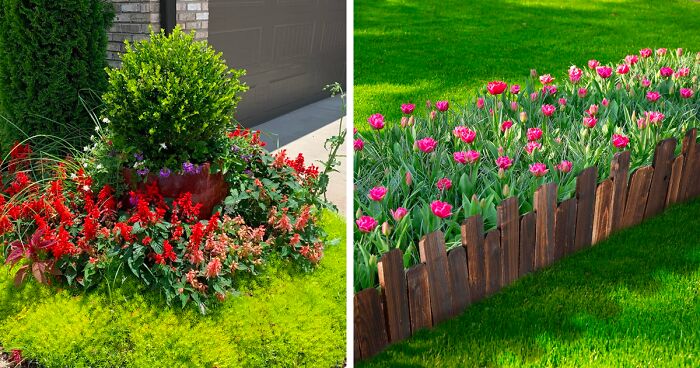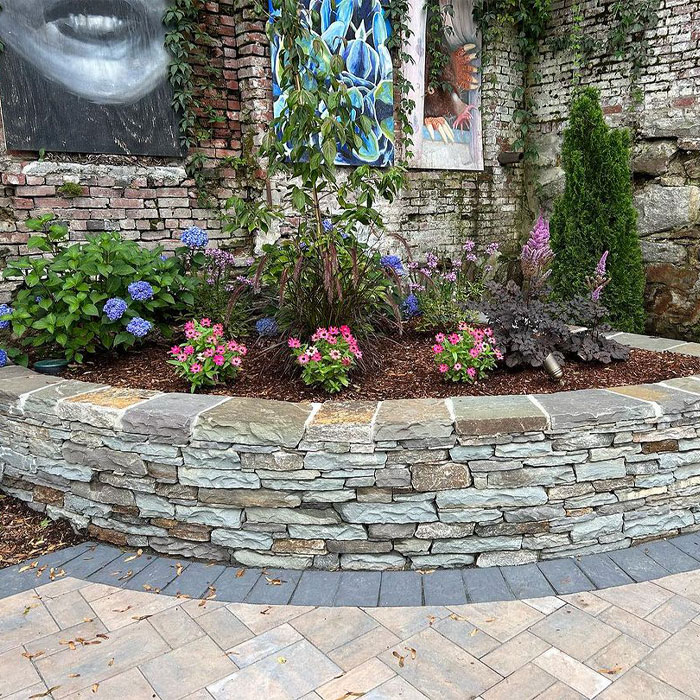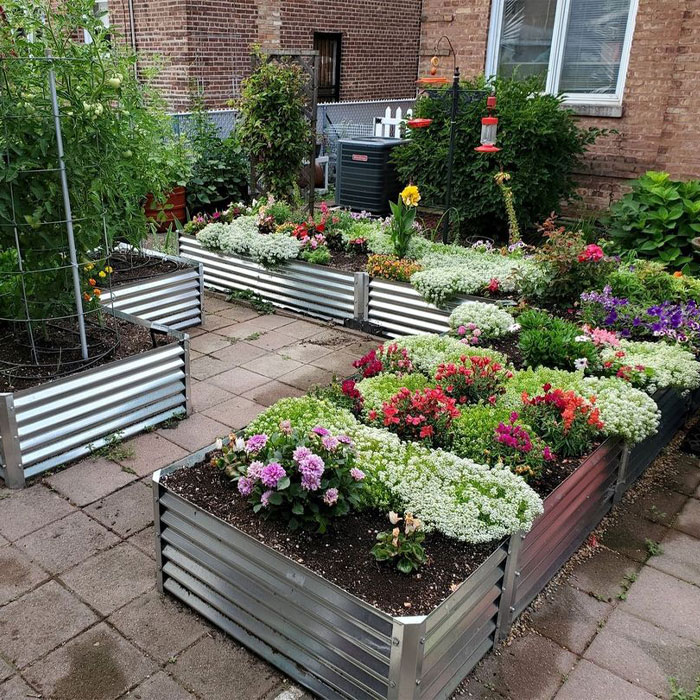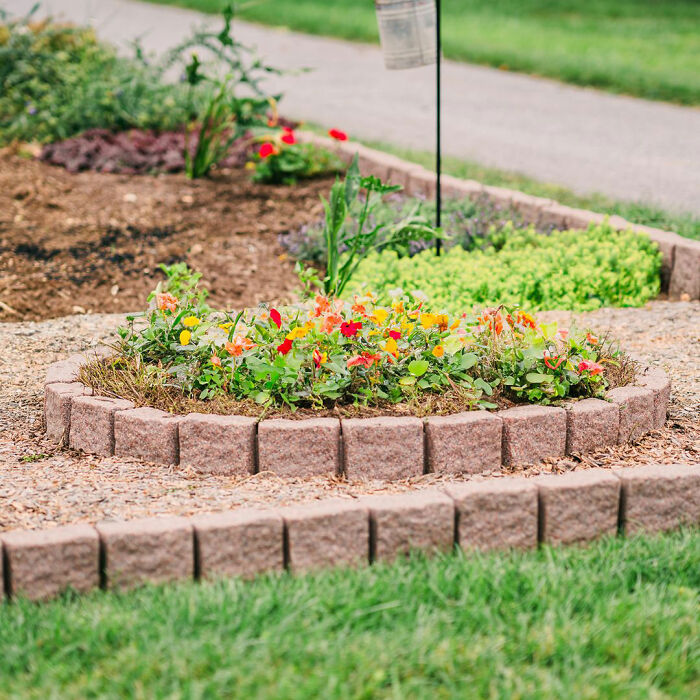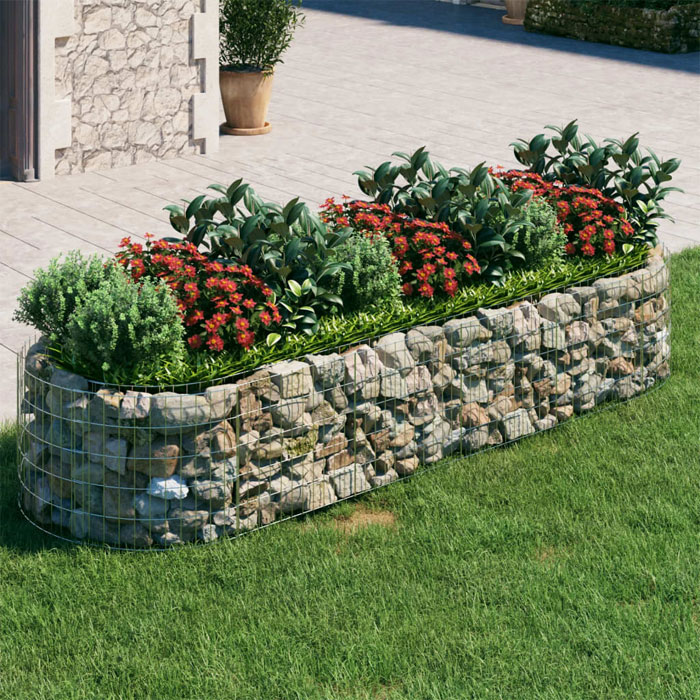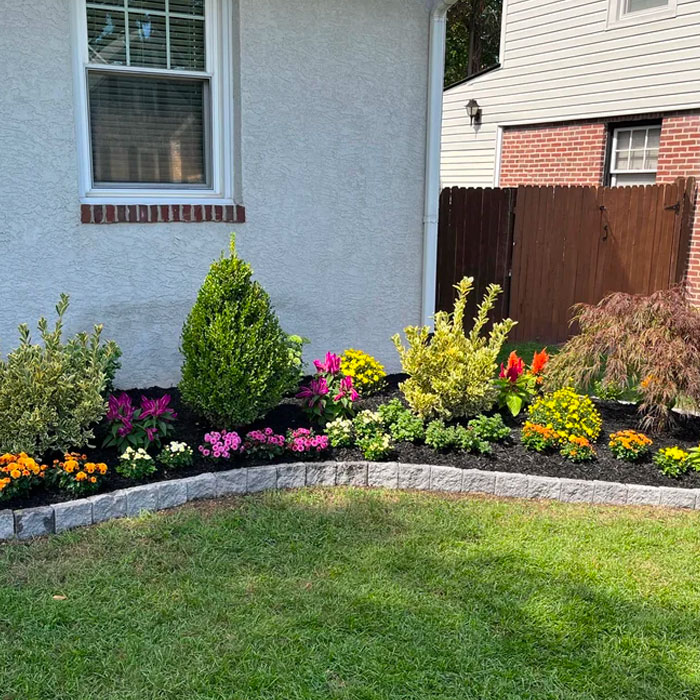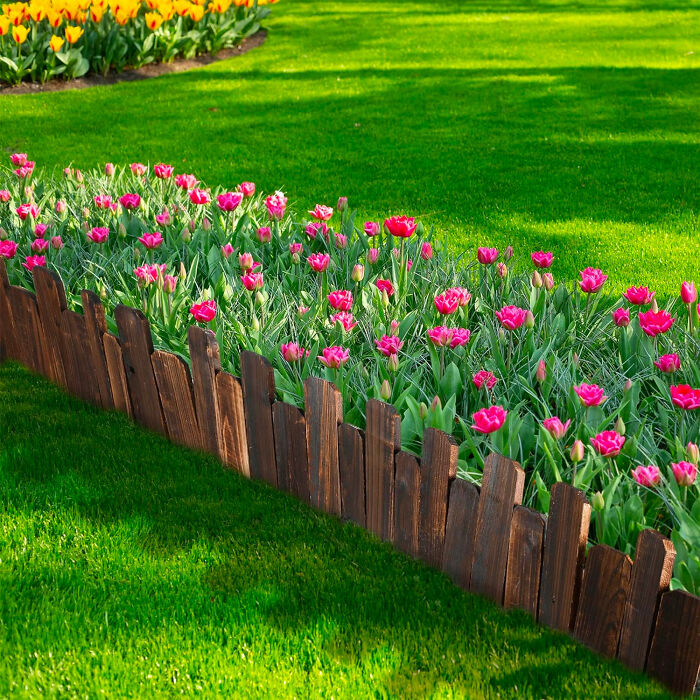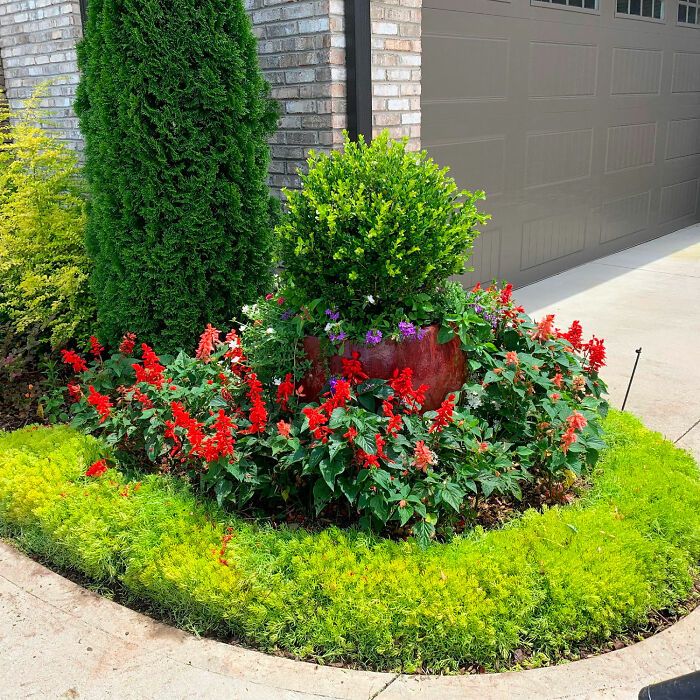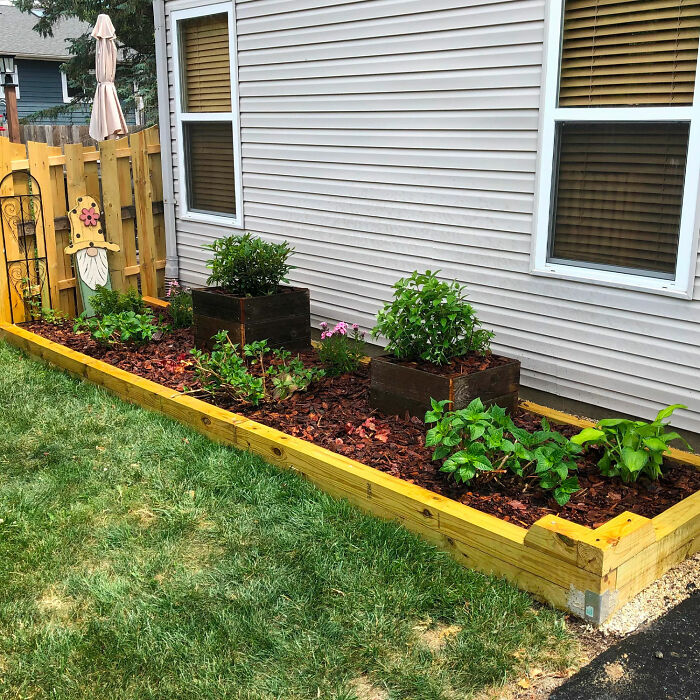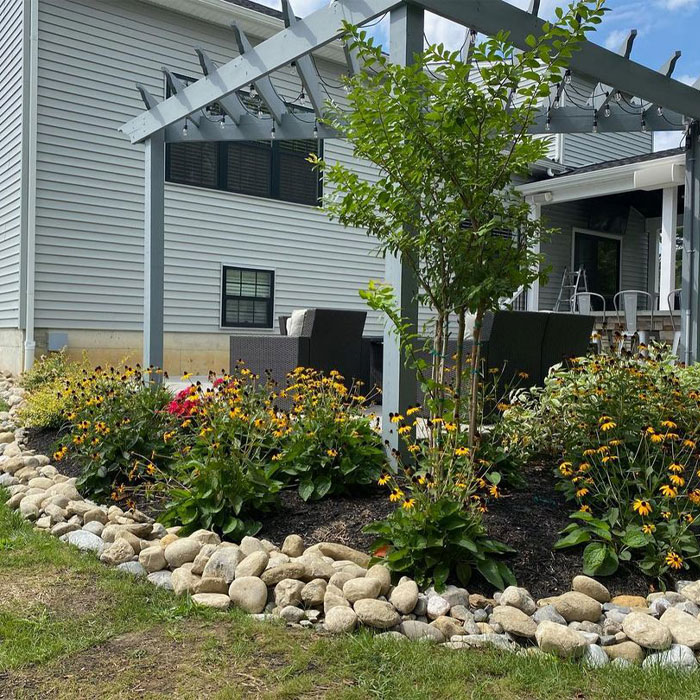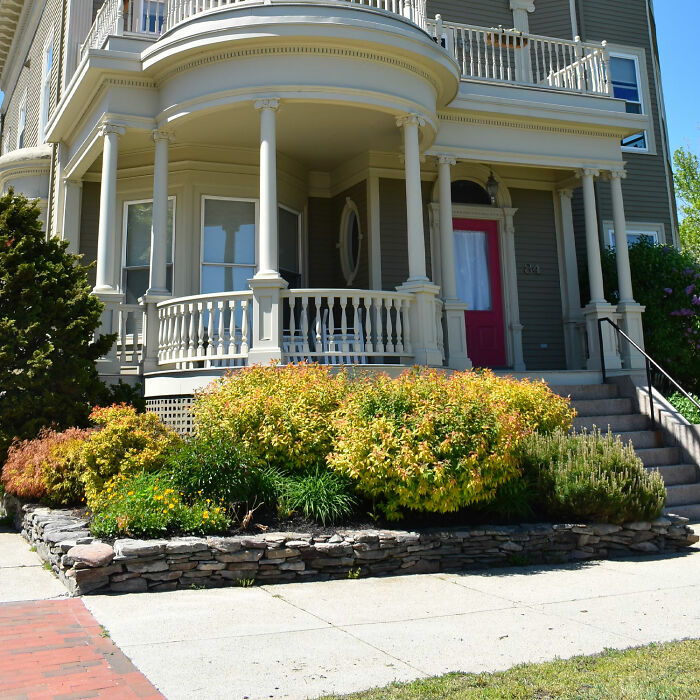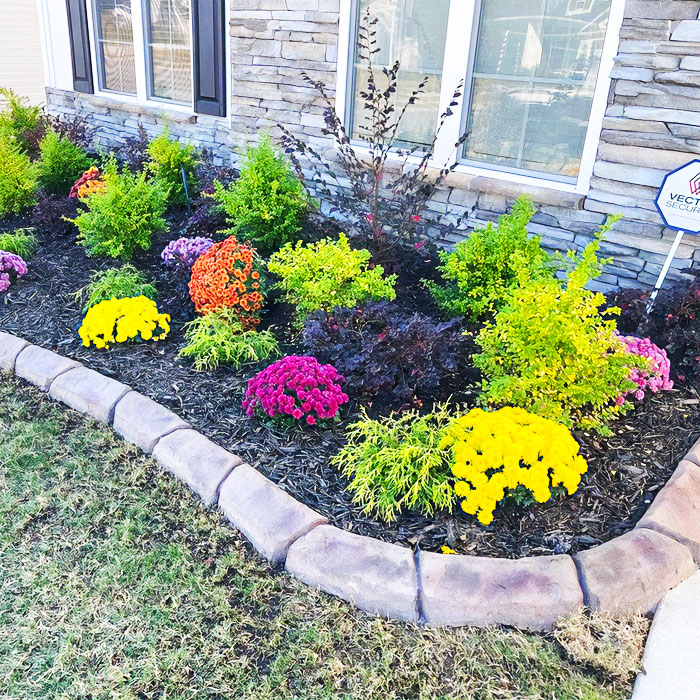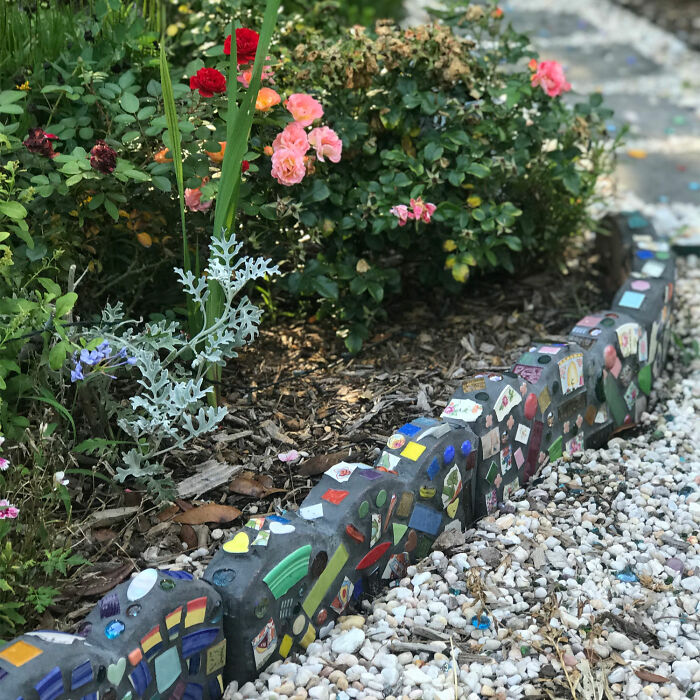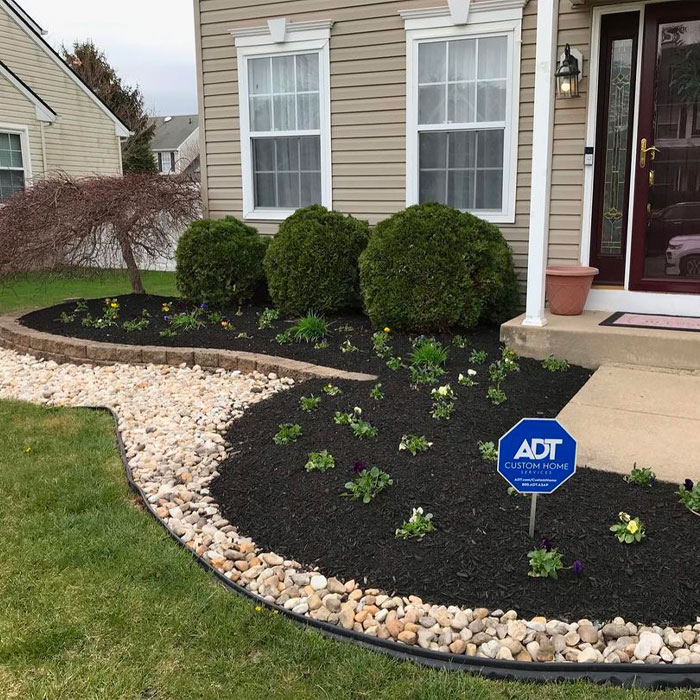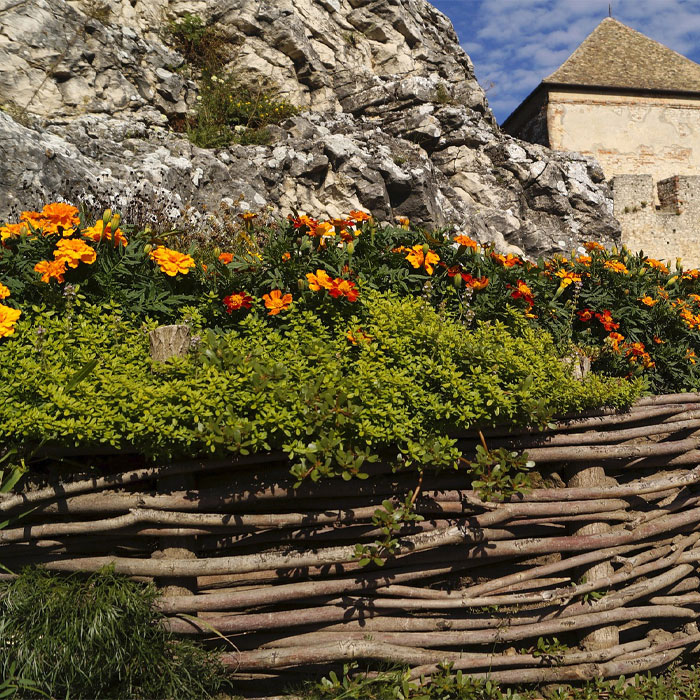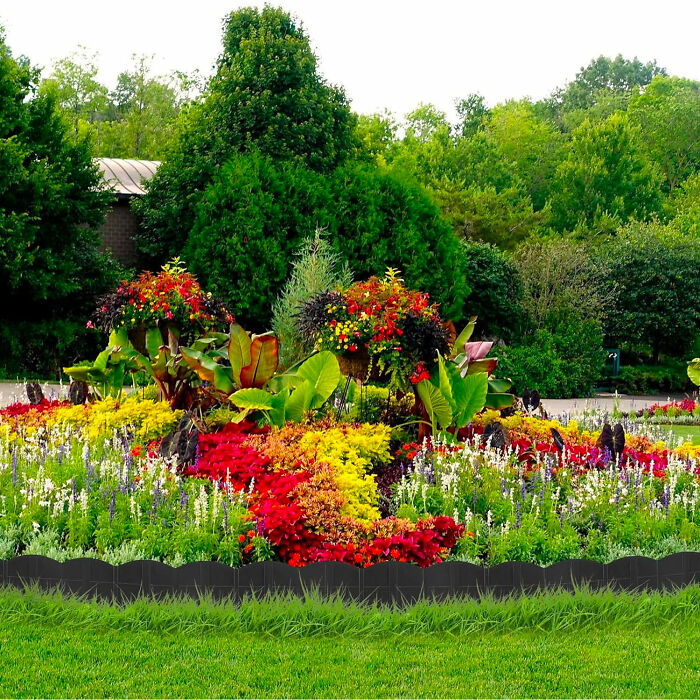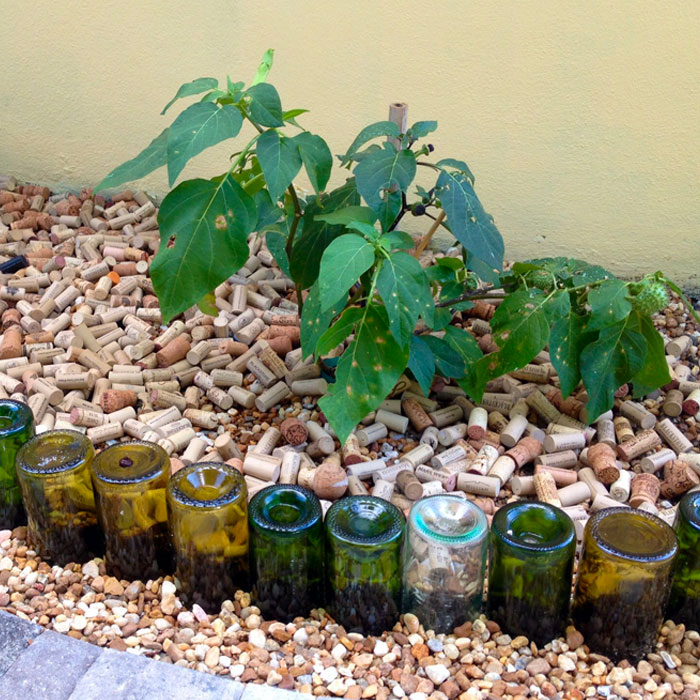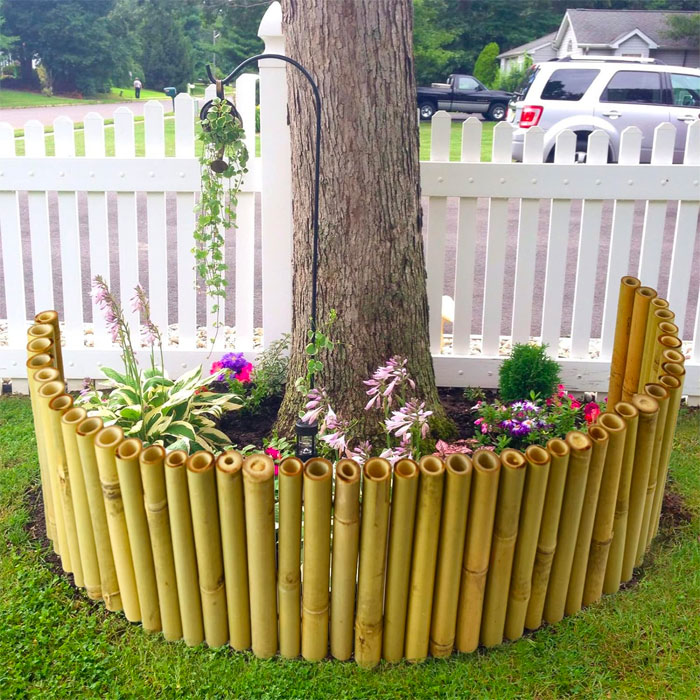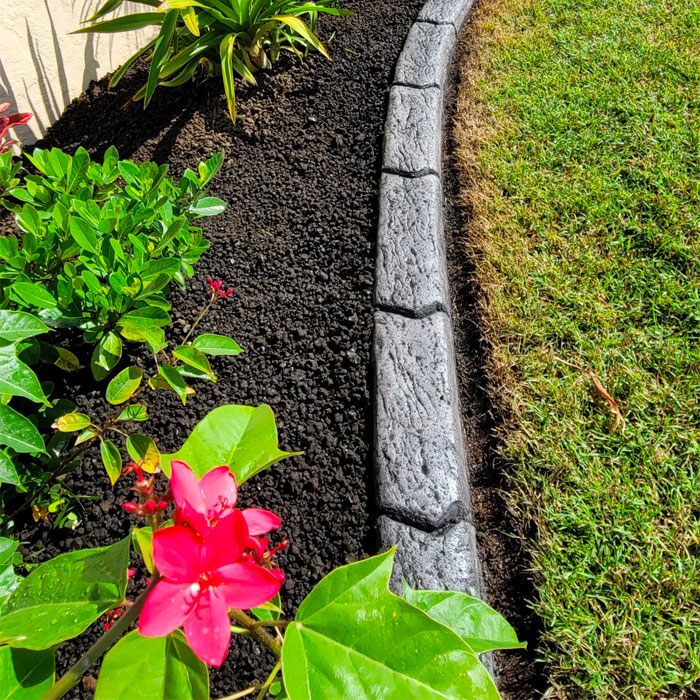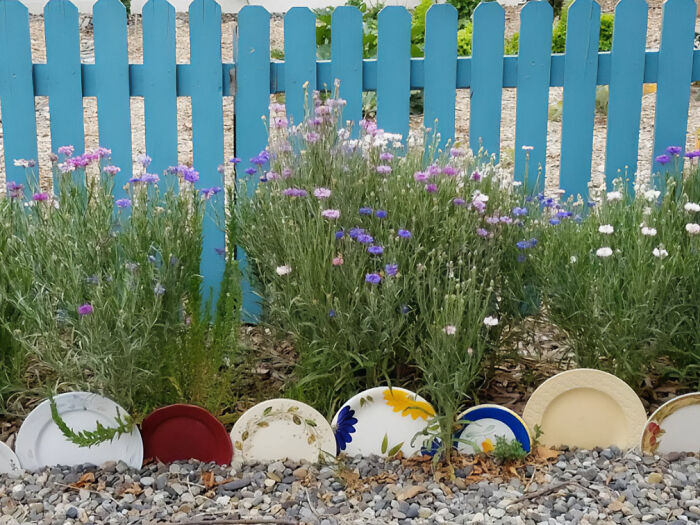Ever looked at your garden and thought, “Hmm, it’s nice, but it could use some… spice”? Well, you’re not alone! Giving your flower beds a neat edge is like adding the perfect frame to your favorite painting—it turns something just “good” into a sure-fire “wow!”
But should you edge your flower beds? In a word, absolutely. Flower bed edging not only keeps your garden tidy by preventing grass from invading your flowers but also elevates the overall look of your outdoor space.
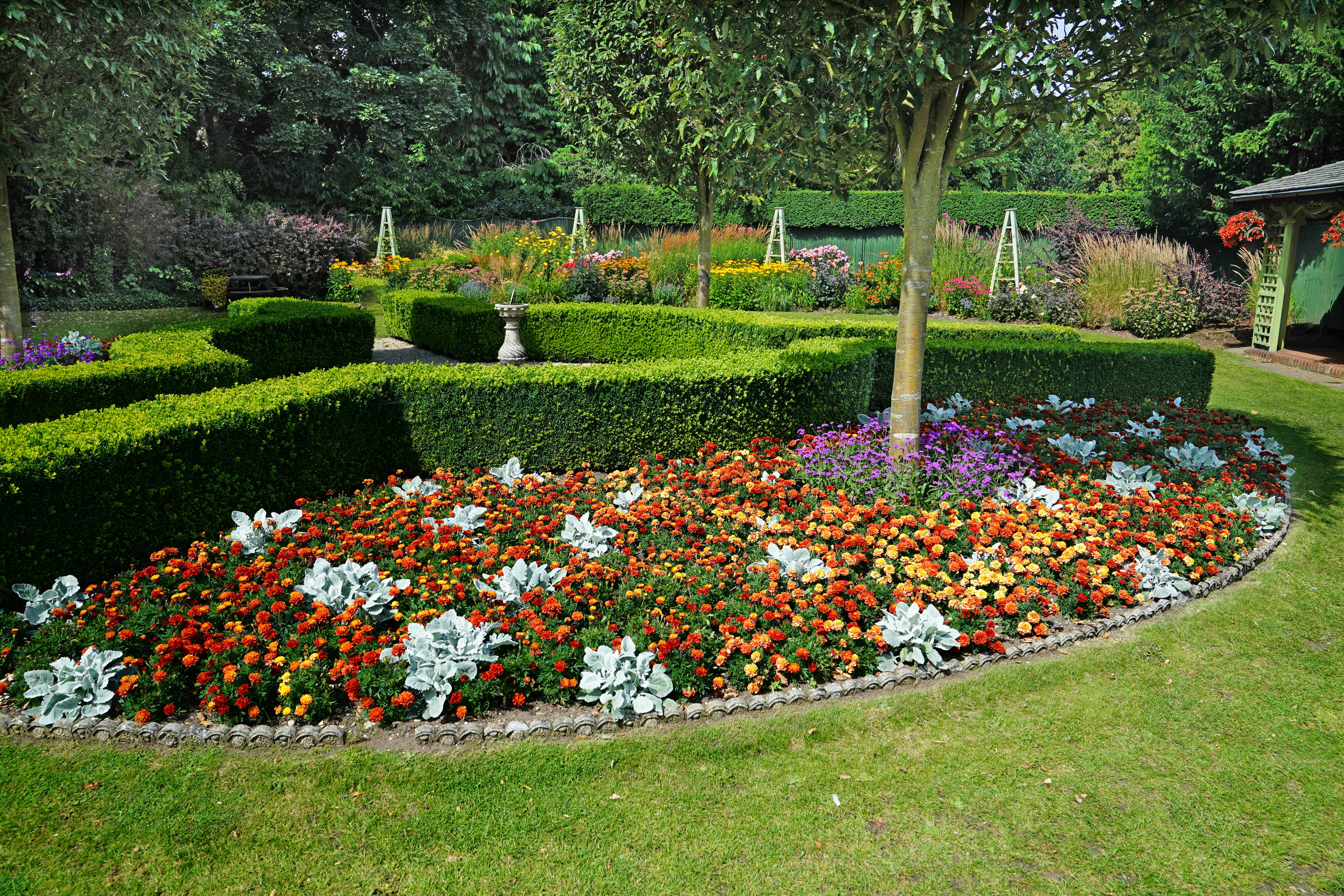 Image credits: Martin Wemyss
Image credits: Martin Wemyss
Now, what’s the best thing to edge a flower bed with? The answer is as varied as your garden’s blooms. From the timeless elegance of stone to the rustic charm of wood, the possibilities are endless. The secret sauce to making your flower beds look stunning lies in choosing an edging material that complements your garden’s style and personal taste.
Ready to transform your garden from blah to breathtaking? Keep reading for affordable, charming, and doable flower bed edging ideas that promise to give your garden the makeover it deserves!
This post may include affiliate links.
Stone Flower Bed Edging
These neatly stacked stones create a solid and stylish boundary for this mix of hydrangeas and annuals. The stone edging is functional and decorative, giving the garden a structured yet natural look. Plus, the curved design of the edging makes it a standout, embracing the garden in a gentle sweep. It has all the right vibes for a stone-edged floral display!
RELATED: Strawberry Vanilla Hydrangea: Growing Tips You Wish You Knew Sooner
Metal Flower Bed Edging
What we’re looking at are raised garden beds neatly outlined with metal borders that add a crisp, clean edge to the flowers inside. It’s like each bed is a little treasure chest overflowing with floral gems. The metal gives it a modern twist, and the blooms bring in the classic beauty of a garden. It’s pretty much a green thumb’s dream combo!
Brick Flower Bed Edging
The bricks here are stacked neatly to create a charming border around the bed, showcasing the flowers tucked inside. It’s a classic garden look that’s both functional and pretty—like a little wall that says, “Here’s where the flower party starts!” And the flowers are definitely having a good time in there, popping up with all sorts of colors. When done well, it’s the kind of edging that makes you want to grab a lemonade, pull up a chair, and just admire the view.
Gabion Flower Bed Edging
The gabion—a cage filled with rocks—serves as a sturdy and eye-catching edge for this flower bed. The robust structure of the gabion wall provides a clear boundary for the bed, and the contrast between the organic shape of the rocks and the manicured plants is visually striking. It’s a practical yet aesthetically pleasing solution that’s becoming more popular in landscapes for its durability and style.
RELATED: 50 Front Yard Landscaping Ideas to Beautify Your Outdoor Space
Cobblestone Flower Bed Edging
If you’re looking for a neat, curved line of stones to frame your plants and flowers, you just found it! Here, each cobblestone is a stepping stone into a world of vibrant colors and textures, guiding your eye through the blooming marvels of the garden. The rocks themselves give off a quaint, old-world vibe, making it look like this garden isn't just growing plants but also growing stories. It’s a style that’s as charming as it is classic!
Fence Flower Bed Edging
First things first: how beautiful are these pink tulips? What we see here is a lovely, rustic touch that adds a bit of country charm to the flower bed, keeping the blooms neatly tucked in a row. The contrast between the rich wooden tones of the fence and the bright floral colors makes for a visually appealing garden feature. It’s a simple, quick, yet effective way to add structure and style to the landscaping.
RELATED: 30 Awesome Examples Of Landscaping Done Right
Flower Bed Edging Using Plants
This edging is alive, literally! Here’s a soft, organic approach that uses the textures and colors of the plants themselves to create a boundary. It’s a seamless integration of form and function, where the plants are doing the edging job, looking gorgeous and defining the space at the same time. A green and blooming edge like this will surely be the envy of your neighbors!
Wood Flower Bed Edging
Practical and pretty, this wood edging frames the garden much like a picture frame, making its array of greenery and blooms look all the more intentional and cared for. The edging keeps everything tidy and gives the soft, green lawn a crisp look. It’s simple, sure, but also super effective.
Rock Flower Bed Edging
If you want your blooms to rock, there’s no better match than this! Here, the stones are piled up in a casual yet deliberate way, hugging the curves of the garden beds with an easygoing grace. It’s as down-to-earth as it gets, creating a charming, relaxed vibe that’s just perfect for any outdoor space wanting a touch of the wild. Simple, effective, and great for your weekend gardening project.
Flagstone Flower Bed Edging
The flagstone edging here is a natural winner, blending effortlessly with the home’s stately presence and the lively greenery. Its natural texture and hues of grey and brown are built into a sturdy wall that exudes an earthy robustness. It’s durable and gorgeous—a reliable companion to your blossoms!
Concrete Flower Bed Edging
The concrete blocks are neatly lined up, providing a strong, smooth border that keeps the bed in shape. They’re like the dependable guardians of the garden, ensuring that those bright and cheery flowers and the lively mix of shrubs have the perfect stage to shine on. Plus, the concrete edging blends seamlessly with the home’s exterior, creating a look that’s as tidy as it is pretty. It’s practical and lovely, all rolled into one—just what you want in a flower bed edge!
Mosaic Tile Flower Bed Edging
Look at this beauty! Each tile is a mini canvas, sporting a rainbow of colors and designs, making this edging a standout spectacle. The plants have their lush greens all tucked in neatly behind this lively procession of mosaic art. It’s the kind of edging that makes you want to take a closer look and gives the garden an extra splash of character.
Pebble Flower Bed Edging
The neatly scattered pebbles form a defined border that’s both practical and pleasing to the eye. They outline the young plants and shrubs, adding a dash of natural elegance to the garden. It’s a smart, no-fuss way to edge a flower bed, giving it a crisp look without overshadowing the blossoming stars of the show. Just a great example of how a simple touch can make a world of difference in garden design!
Woven Willow Flower Bed Edging
The woven branches create a rustic border that cradles a burst of greenery and orange flowers. It’s like a natural hug around the blooms, crafted from the willow’s own limbs. This type of edging adds a touch of countryside whimsy (the good kind!) and blends seamlessly with the garden’s vibe. It’s traditional and artistic, giving the flower bed a neat, structured look while keeping things feeling all-natural.
Plastic Flower Bed Edging
This black plastic edging curves gracefully around the bed, leaving the flowers to do the job of standing there and looking insanely gorgeous! The material is durable and flexible, ideal for creating smooth lines. It’s a practical choice, too, as plastic stands up well against the elements and makes for easy maintenance. It does its job here without taking the spotlight away from the floral show-stopper it encircles.
Wine Bottle Garden Edging
Those upturned wine bottles create a unique and eye-catching border that’s as eco-friendly as it is stylish. It’s a creative spin on repurposing, turning what would be recycling bin fodder into a garden highlight. The green glass catches the light and adds a bit of sparkle to the mix, all while keeping the garden beds neatly defined. It’s a fun touch that shows off a love for gardening and a flair for innovative, sustainable design. A toast to green thumbs and green living!
RELATED: 30 Repurposing Ideas To Spark Your Imagination And Reduce Waste
Bamboo Flower Bed Edging
This edging is not only eye-catching but also eco-friendly, giving the garden a touch of organic style. The bamboo canes stand tall, creating a natural yet polished look that encircles the tree and its floral companions. It’s a refreshing change from the usual, with a clear nod to sustainable gardening practices. Plus, it adds a zen-like vibe that’s both calming and inviting. A great pick for anyone looking to add a bit of green flair to their garden!
RELATED: Panda’s Guide to Growing and Caring for a Bamboo Plant
More Concrete Curbing
Here’s another example of how you can use concrete to build a strong, practical, yet stylish flower bed edging. The continuous, smooth concrete edge snakes through the garden with precision, providing a crisp boundary between the lush green lawn and the rich, dark soil of the flower bed. Its stone-like texture adds a touch of sophistication, while its durability ensures it can handle whatever the weather throws its way.
Dinner Plate Flower Bed Edging
These half-buried brightly painted plates bring a burst of color and whimsy to the garden’s edge. It’s a quirky and charming way to repurpose old dinnerware, turning the flower bed border into an open-air gallery of ceramic art. This creative edging solution turns heads and starts conversations, blending practical gardening with an artist’s touch.
How to Edge A Flower Bed Like a Pro
So, you’ve decided to give your garden that much-needed makeover by edging your flower beds. Bravo! Not only are you about to boost your garden’s curb appeal, but you’re also stepping into the shoes of a garden pro. But how do you ensure that your edging doesn't just look good on day one but continues to impress season after season? It all starts with knowing just how deep to dig.

A good rule of thumb is to edge about 2 to 4 inches deep. It’s enough to create a definitive barrier for grass roots and keep your edging material in place, but also shallow enough to avoid disturbing any underground utilities or causing drainage issues. Possibly do it shortly after rainfall so the soil is softer.
But don't just stop at digging. To edge like a pro, follow these simple steps.
Step 1: Get your tools
 Whether it’s a spade, a half-moon edger, or even a power edger, pick the tool that you’re most comfortable with. It’ll make the job easier and more enjoyable. Don’t forget gardening gloves for protection and knee pads for extra comfort.
Whether it’s a spade, a half-moon edger, or even a power edger, pick the tool that you’re most comfortable with. It’ll make the job easier and more enjoyable. Don’t forget gardening gloves for protection and knee pads for extra comfort.
Step 2: Mark your lines

Use a garden hose to mark the shape of your edging. This visual guide will ensure your lines are smooth and your curves are graceful.
Step 3: Get digging

Following your marked line, dig down 2 to 4 inches and remove the grass and soil to create your edge. Aim for a 90-degree angle between the lawn and your flower bed if you want a sharp, professional look.
Step 4: Refine and fill

Once you’ve got your edge, you can refine it and fill it in with your chosen edging material. Be it stones, bricks, or even mulch, this is where your garden starts to shine. You could also add compost to improve soil quality and place landscape fabric to further prevent weeds from encroaching on your flower beds.
RELATED: 30 Most Common Types Of Weeds In Gardens And How To Control Them
Edging your flower beds can be a weekend project that becomes an investment in your garden’s future beauty. With the right depth and a bit of elbow grease, you’ll have edges that look professional and are also built to last. So, grab your tools, and let’s make those garden edges sharp enough to make your neighbors green with envy!
FAQs
How Do You Make a Natural Flower Bed Edge?
Creating a natural flower bed edge is all about working with what Mother Nature gave you. Consider using naturally found materials like stones, river rocks, or even wood logs. These elements blend seamlessly into your garden, enhancing its natural beauty without needing fancy gadgets or expensive materials. Plus, it’s a great workout and an excuse to spend more time outdoors!
What is the Cheapest Way to Do an Edging?
You’re in luck if you want to add some definition to your garden without breaking the bank. The cheapest way to edge a flower bed is to use materials you already have on hand. Old bricks, stones, or even repurposed bottles can create a charming, eclectic look.
For a super budget-friendly option, digging a trench edge is cost-free and only requires a bit of elbow grease. Simply drill a narrow trench along the border of your flower bed to create a clean, distinct line. It’s straightforward, effective, and, best of all, free!
READ NEXT:
Game-changing Lawn Care Tips & Tricks for Lawn Maintenance
Best Battery Powered Lawn Mower For Every Kind Of Lawn (And Budget)

 Dark Mode
Dark Mode 

 No fees, cancel anytime
No fees, cancel anytime 


